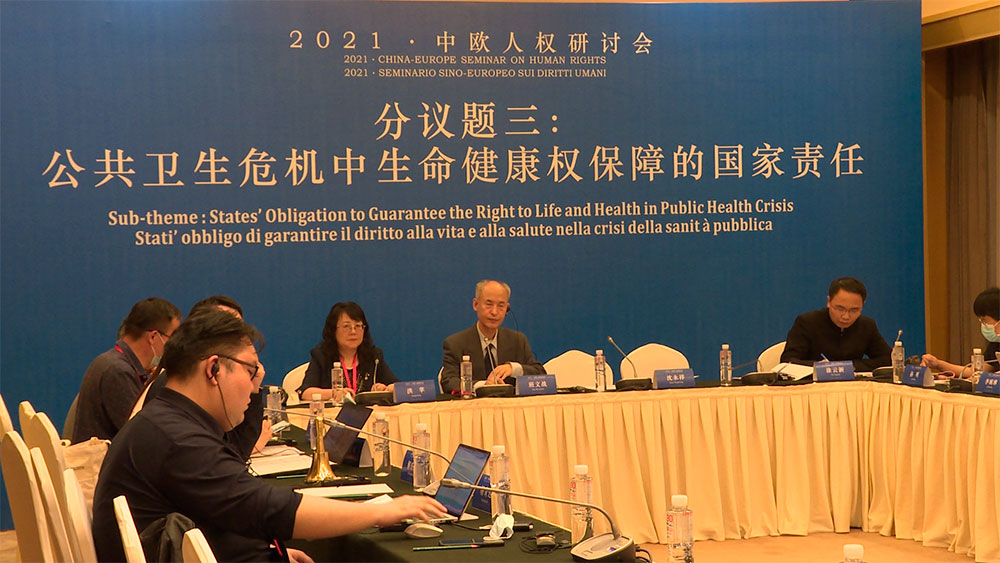
Session III: State Responsibility for the Right to Life in Public Health Crises. (photo provided to iChongqing)
Chongqing, June 10, 2021 -- As part of the now-concluded 2021 China-Europe Seminar on Human Rights held in Chongqing’s Yuzhou Hotel on Tuesday, the parallel session of “State Responsibility for the Right to Life in Public Health Crisis” attracted perhaps the most attention from and evoked global discussions among the world’s top health authorities and experts.
Some 26 domestic and international government officials, human rights experts, political science scholars, and public health researchers attended the online and offline session, building on the China-Europe Seminar platform to conduct in-depth discussions and exchanges on the protection of human rights amid a global public crisis and to allow various countries to learn from each other.
“The ravaging coronavirus has brought one of the most tremendous harms and disruption upon the human population and their innate rights to life and health,” said Mr. Shao Chunbao, a researcher of Peking University’s China Center for Strategic Studies, in his keynote speech. “And to any sovereign country that truly prioritizes its people’s health and lives, the need to better protect its population from the recurring epidemic crisis has become more urgent than ever.”
Taking mask-wearing as an example, Mr. Shao urged certain western countries to discard their system superiority mentality and ungrounded prejudices against the East and fine-tune their positions on individualism vs. collectivism to adapt to the changing international environment caused by the COVID-19 pandemic.
Professor Peter Herrmann with the Central South University, who is also a member of the European Academy of Sciences and Arts in Germany, echoed Mr. Shao’s opinion on seeking common ground and putting differences aside in protecting the health of the human population.
“Since as early as the mid-1990s, the policymakers of the European Union have put greater and greater emphasis on property privatization, bringing far-reaching implications to society’s various sectors including medical services and health care,” Herrmann said. “The public’s endless pursuit of freedom over equality has caused the failure of many public health systems in the direction of trampling the baseline of human rights.”
The China Family Planning Association played a pivotal role in building the country’s “Health Protection Net” during the COVID-19 pandemic and has come a long way in its promotion of family planning, reproductive health care, gender equality, and rights protection, making indelible contributions to the global fight against the coronavirus, according to Ms. Hong Ping, member of the Leading Party Group of China Family Planning Association.
“During the height of the pandemic, our grassroots social workers and volunteers kept close contacts with the elderly living alone and people living under the poverty line via phone calls and WeChat messages to tend to their needs; organized social charity events to donate diapers, tampons, and some other sanitary and disinfectant necessities to front-line female medical workers; and provided educational and consulting services to equip the public with strongest-possible rumor destroyers — first-hand information on the scientific basics of the coronavirus and epidemic control and prevention measures.”
As a Senior Researcher of the Center for China and Globalization Studies, Mr. Harvey Dzodin mainly talked about the centuries-old jurisdiction principle of “Clean Hands,” which is based on the maxim of equity that states one “who comes into equity must come with clean hands,” in his keynote speech.
“Recently, some western countries led by the United States have been relentlessly accusing China of human rights violations in Xinjiang Uygur Autonomous Region in a seemingly coordinated effort to suppress the economic and political rise of China,” said Dzodin. “However, from my perspective based on the long-observed principle of equity, these countries have to right to accuse some other country when they themselves have been struggling to provide the basic health rights to their populations and blatantly trampling on their minority populations’ human rights.”
The rising racism and anti-Asian crimes in the United States after former President Donald Trump’s frequent phrasing of “Kungfu Virus,” “Wuhan Virus,” and “China Virus” has only proven again and again the inability of Washington to cope with the pandemic and their desperate attempt to shift the blame to some other countries, he added.
“The COVID-19 challenge has laid bare the widening rifts and fissures of post-WWII international order, and now is the time for the whole world to do a bottom-up retrospection and prevent any possible mass public health crisis that could have a devastating impact on the existence of humankind from happening again,” Mr. Harvey Dzodin said.
The parallel session also featured some other interesting lectures and dialogues, including a comparative analysis of Missouri and China, a study report on the national capacity in the prevention and control of COVID-19, a speech on the state’s protective obligations under the International Covenant on Economic, Social and Cultural Rights, a lecture on the state’s obligation to publish epidemic information, an analysis on genetic technology and rights protection in the era of Big Data.


